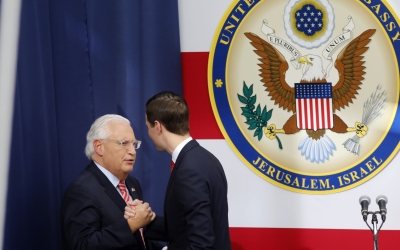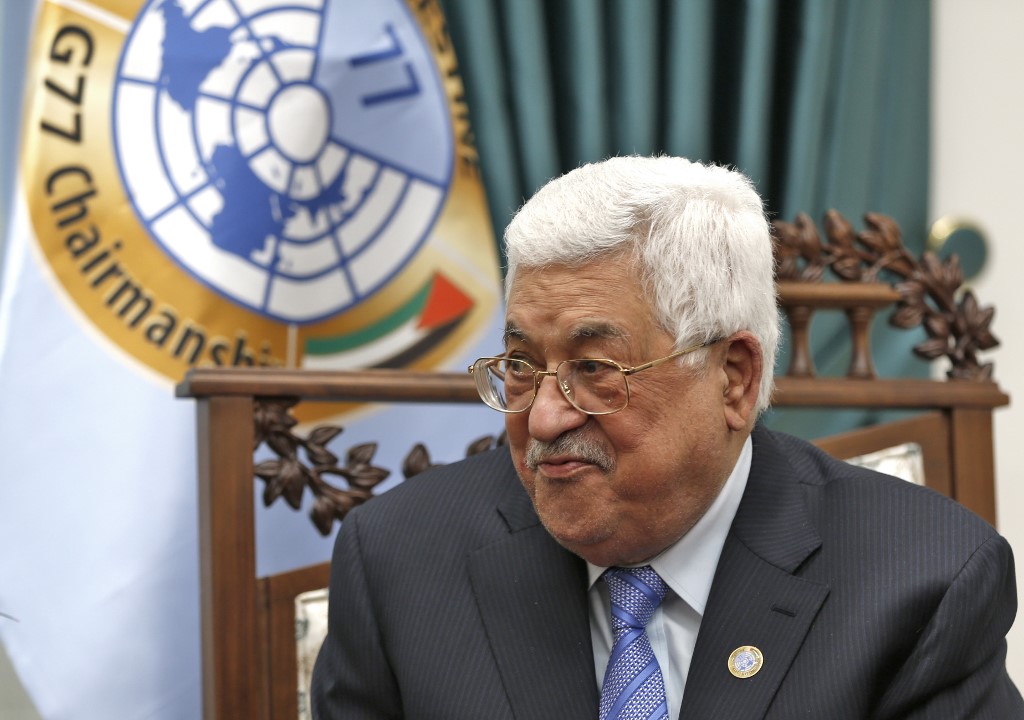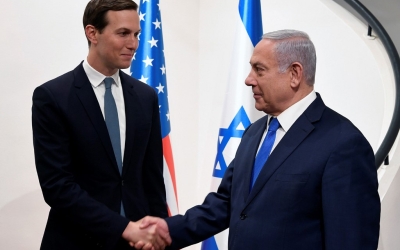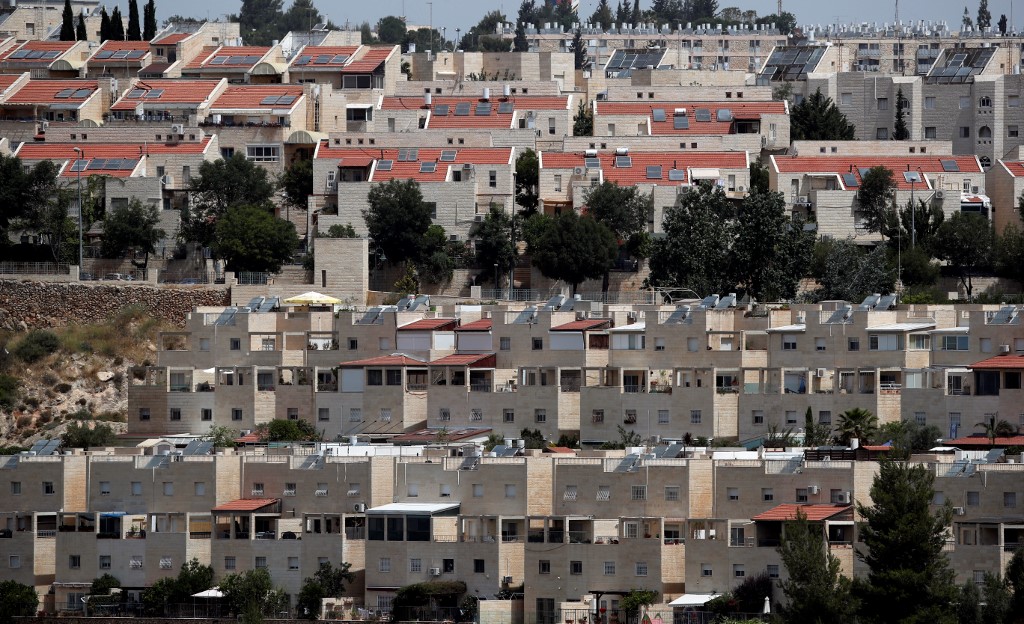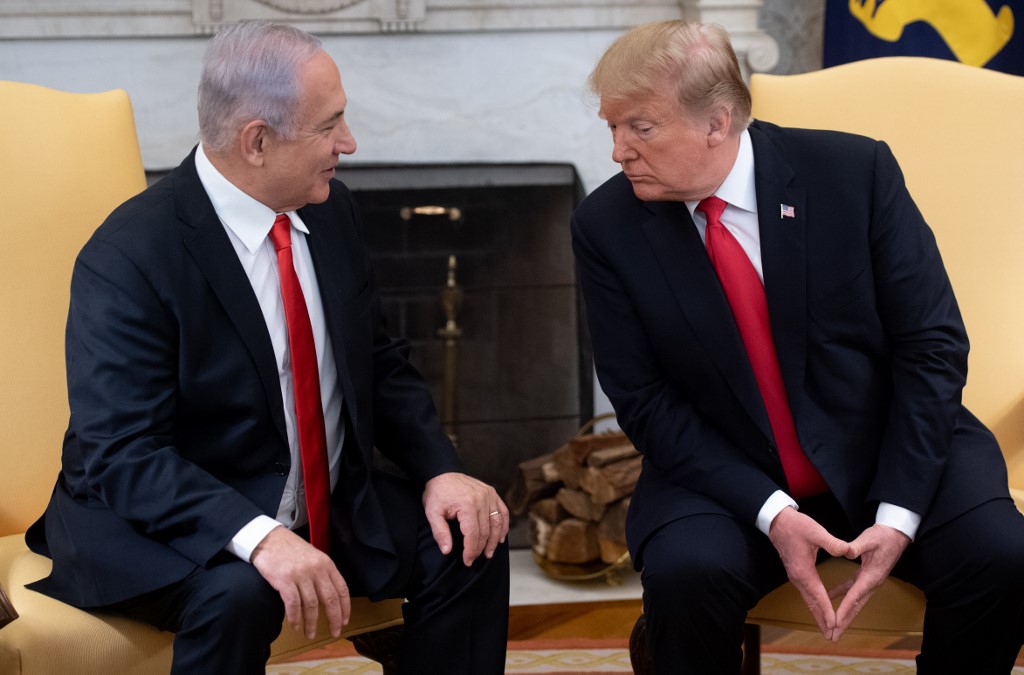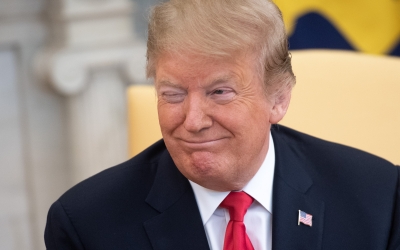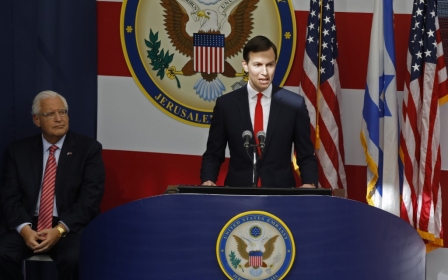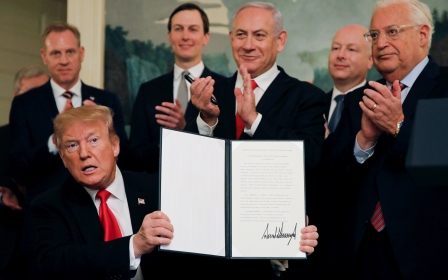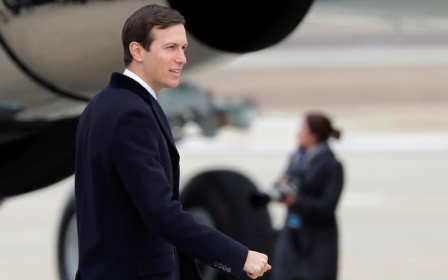Trump enjoys bipartisan support for his plan to eradicate the Palestinian cause
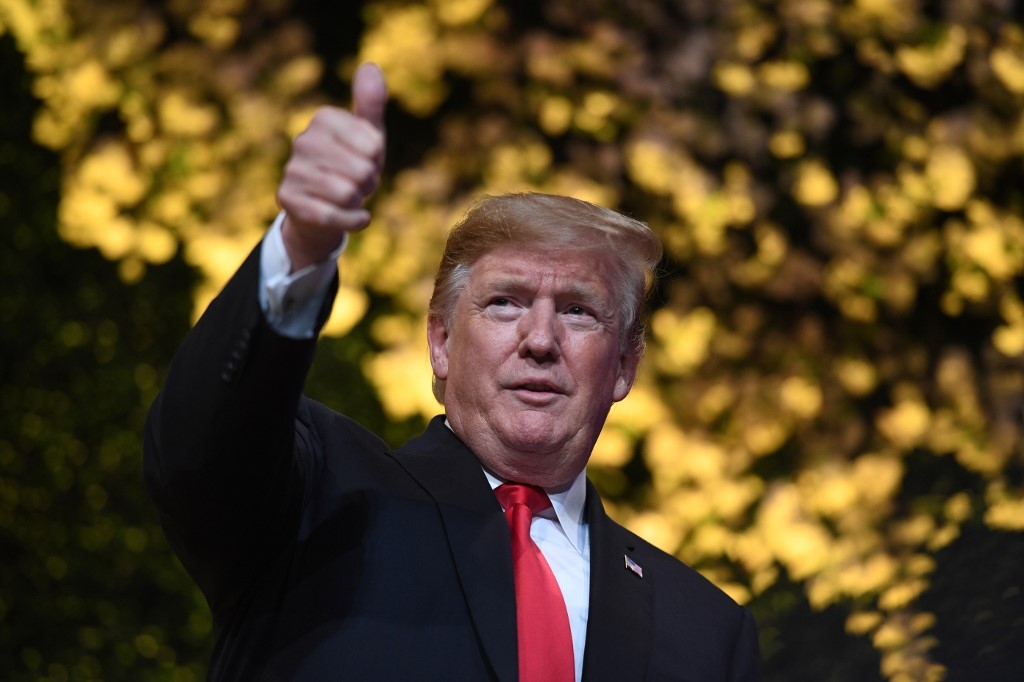
The White House’s prolonged financial bullying of the Palestinian Authority (PA), the Palestinians’ government-in-waiting, has reached the point where there are now credible warnings that it is close to collapse. The crisis has offered critics further proof of the administration’s seemingly chaotic, often self-sabotaging approach to foreign policy matters.
Meanwhile, US officials charged with resolving the Israeli-Palestinian conflict have demonstrated ever more blatant bias, such as the recent claims by David Friedman, the ambassador to Israel, that Israel is “on the side of God” and should have the “right to retain” much of the West Bank.
There’s nothing especially ‘Trumpian’ about the administration’s emerging ‘peace process’
Again, critics view the Trump administration’s approach as a dangerous departure from the traditional US role of “honest broker”.
Such analyses, however common, are deeply misguided. Far from lacking a strategy, the White House has a precise and clear one for imposing a solution to the Israeli-Palestinian conflict – President Donald Trump’s so-called “deal of the century”. Even without publication so far of a formal document, the plan’s contours are coming ever more sharply into relief, as its implementation becomes observable on the ground.
Repeated delays in announcing the plan are simply an indication that Trump’s team needs more time to engineer a suitable political environment for the plan to be brought out of the shadows.
Further, the Trump administration’s vision of the future for Israelis and Palestinians – however extreme and one-sided – has wide, bipartisan support in Washington. There’s nothing especially “Trumpian” about the administration’s emerging “peace process”.
Choking off aid
Paradoxically, that was evident last week, when leading members of the US Congress from both sides of the aisle introduced a bill to boost the ailing Palestinian economy by $50m. The hope is to create a “Partnership Fund for Peace” that will offer a financial fillip to Israelis and Palestinians seeking to resolve the conflict – or, at least, that is what is being claimed.
This sudden concern for the health of the Palestinian economy is a dramatic and confusing U-turn. Congress has been an active and enthusiastic partner with the White House in choking off aid to the PA for more than a year.
Mohammad Shtayyeh, the Palestinian prime minister, told the New York Times last week that the PA was on the brink of implosion. “We are in a collapsing situation,” he told the newspaper.
The PA’s crisis comes as no surprise. Congress helped initiate it by passing the Taylor Force Act in March 2018. It requires the US to halt funding to the PA until it stops paying stipends to some 35,000 families of Palestinians jailed, killed or maimed by Israel.
On the brink of collapse
Previous US administrations might well have signed a waiver to prevent such legislation from going into effect – just as presidents until Trump blocked a congressional law passed in 1995 demanding that the US move its embassy to Jerusalem.
But the Trump White House is not interested in diplomatic face-saving or reining in the pro-Israel zealotry of US legislators. It fervently and explicitly shares the biases that have long been inherent in the US political system.
In line with the Taylor Force Act, the White House has cut off vital funds for Palestinians, including to UNRWA, the United Nations’ refugee agency for Palestinians, and to hospitals in Israeli-occupied East Jerusalem.
The decision by Congress to throttle the PA has had further repercussions, leaving Israeli Prime Minister Benjamin Netanyahu exposed domestically. Not daring to be seen as less anti-PA than US legislators, Netanyahu implemented his own version of the Taylor Force Act earlier this year.
Since February, he has withheld a portion of the taxes Israel collects on behalf of the PA, the vast bulk of its income, equal to the stipends transferred to the Palestinian families of prisoners and casualties of Israeli violence – or those who Israel and the US simplemindedly refer to as “terrorists”.
That, in turn, has left Mahmoud Abbas, the Palestinian president, in an impossible position. He dare not be seen accepting an Israeli diktat that legitimises withholding Palestinian money, or one that defines as “terrorists” those who have sacrificed the most for the Palestinian cause. So he has refused the entire monthly tax transfer until the full amount is reinstated.
Now, just as these various blows against the PA finally threaten to topple it, the US Congress suddenly prepares to step in and bail out the Palestinian economy with $50m. What on earth is going on?
‘Money in return for quiet’
The small print is telling. The PA, the Palestinians’ fledgling government, is not eligible for any of the US Congress’s promised largesse.
If the legislation passes, the money will be handed to “Palestinian entrepreneurs and companies”, as well as non-governmental organisations, willing to work with the US and Israel on “people-to-people peace-building” programmes and “reconciliation between Israelis and Palestinians”.
The PA is being bypassed yet again, as the US and Israel try to bolster an alternative economic, rather than political, leadership
In other words, the legislation is actually designed as another strike against the Palestinians’ existing leadership. The PA is being bypassed yet again, as the US and Israel try to bolster an alternative economic, rather than political, leadership.
This move by US representatives is not occurring in a vacuum. Since the effective collapse of the Oslo accords nearly two decades ago, Washington has sought to downgrade a national conflict that needs a political solution into a humanitarian crisis that needs an economic one.
It is a variation on Netanyahu’s long-standing goal to smash the Palestinian national struggle and replace it with so-called “economic peace”.
Where once the goal of peacemaking was “land in exchange for peace” – that is, a Palestinian state in return for an end to hostilities – now the aim is “money in exchange for quiet”. The US is now formally supporting Israel’s efforts at economic pacification.
Outrage at new elections
The Trump administration has devised a two-stage process for neutralising Palestinians.
Firstly, Trump’s son-in-law, Jared Kushner, has been tasked with winning over Arab states, particularly those in the oil-rich Gulf, to stump up money for pacifying Palestinians and their neighbours.
This is the aim of an investment conference due to be held in Bahrain later this month – the lynchpin of the “deal of the century”, not simply a prelude to it.
That was why Trump himself was so visibly outraged at the delay caused by Netanyahu’s decision to dissolve the Israeli parliament last month, a reflection of his political weakness as he faces imminent corruption trials. The new elections in Israel, Trump grumbled, were “ridiculous” and “messed up”.
The intention of the Bahrain conference is to use tens of billions of dollars raised by Washington to buy off opposition to the Trump deal, chiefly from Egypt and Jordan, which are critical to the pacification programme’s success.
Any refusal by the Palestinians to surrender, either in Gaza or the West Bank, could have major repercussions for these neighbouring states.
Search for alternative leaders
Secondly, Friedman is at the centre of efforts to identify recipients for the Gulf-funded handouts. He has been seeking to forge a new alliance between the settlers, with whom he is closely aligned, and Palestinians who may be willing to help in the pacification project. Late last year, he attended a meeting of Palestinian and Israeli business leaders in the West Bank city of Ariel.
Afterwards he tweeted that the business community was “ready, willing and able to advance joint opportunity & peaceful coexistence. People want peace and we are ready to help! Is the Palestinian leadership listening?”
Friedman has made no bones about where his – and supposedly God’s – priorities lie, throwing his weight behind the growing clamour in Israel to annex much of the territory that was once seen as integral to creating a Palestinian state. With that as the administration’s lode star, the task is now to find a Palestinian leadership prepared to stand by as the finishing touches are put on a Greater Israel ordained by God.
Concerns in Washington about the PA’s unwillingness to comply were voiced last week by Kushner, though he dressed them up as doubts about the Palestinians’ ability to govern themselves. He said of the PA: “The hope is that they, over time, will become capable of governing.” He added that the real test of the administration’s plan would be whether Palestinian areas became “investable”.
“When I speak to Palestinian people, what they want is they want the opportunity to live a better life. They want the opportunity to pay their mortgage,” he said.
Washington is therefore looking to influential families in the West Bank that could potentially be recruited with bribes to serve as an alternative, compliant leadership. In February it was reported that around 200 businesspeople, Israeli mayors and heads of Palestinian communities met in Jerusalem "to advance business partnerships between Israeli and Palestinian entrepreneurs".
Corrupt tribal fiefdoms
It has been natural for the Trump administration to look to a business elite – one that, it hopes, will be prepared to forgo a national solution if the economic environment is liberalised enough to allow for new regional and global investment opportunities.
These individuals belong to extended families that dominate the West Bank’s major cities. Such powerful families may be prepared to assist in the elimination of the PA, in return for a corrupt patronage system allowing them to take control of their respective cities.
Palestinian analysts, like Samir Awad, a politics professor at Bir Zeit University near Ramallah, have told me that the Israeli and US vision of Palestinian “autonomy” may amount to little more than a system of tribal fiefdoms, reminiscent of Afghanistan.
Palestinian business leaders have been quietly developing ties with counterparts in the settler movement, such as Avi Zimmerman
There are already a few Palestinian partners emerging, such as Hebron businessman Ashraf Jabari, who is reportedly planning to attend the Bahrain conference.
He and other business leaders have been quietly developing ties with counterparts in the settler movement, such as Avi Zimmerman. Together, they have set up a joint chamber of commerce covering the West Bank.
It is precisely such initiatives that are being promoted by Friedman and would be eligible for grants from the $50m fund the US Congress is currently legislating.
Ultimately, these Palestinian business “partners” could form an elite to serve as an ostensible national address for the international community in its dealings with the Palestinian people.
Sword over PA’s head
The PA doesn’t have to be discarded for the Trump plan to progress. But alternative national and local leaderships need to be cultivated by Washington to serve both as a sword hanging over the PA’s head, to encourage it to capitulate, and as an alternative ruling class, should the PA fail to submit to the “deal of the century”.
In short, Washington is playing a game of chicken with Abbas and the PA. It is determined that the Palestinians will blink first.
Deeply implicated in Washington’s vision, even if largely out of sight, are the Arab states, whose role is to strong-arm whatever Palestinian leadership is required for the Greater Israel “deal of the century” to be implemented.
The burden of managing the Israeli-Palestinian conflict will shift once again. When Israel occupied the Palestinian territories in 1967, it became directly responsible for the welfare of Palestinians living there.
Since the mid-1990s, when the Palestinian leadership was allowed to return under the Oslo accords, the PA has had to shoulder the task of keeping the territories quiet on Israel’s behalf. Now, after the PA has refused to sign off on Israel’s ambitions to take for itself East Jerusalem and much of the West Bank, the PA is increasingly seen as having outlived its usefulness.
Instead, Palestinian expectations may have to be managed via another route – through the key Arab states of Saudi Arabia, the United Arab Emirates, Egypt and Jordan. Or, as Palestinian analyst Hani al-Masri recently noted, the Bahrain conference “foreshadows the beginning of abandoning the [Palestine Liberation Organization] as the Palestinians’ representative, thereby opening the door … for a new era of Arab patronage over the Palestinians to take hold.”
Years of imperial overreach
Under Trump, what has changed most significantly in the US approach to the Israeli-Palestinian conflict is the urgency of Washington’s efforts to set aside the Palestinian national struggle once and for all.
Since the Six-Day War of 1967, US administrations – with the possible exception of Jimmy Carter’s – had only a marginal interest in forcing a settlement on Israelis and Palestinians. Aside from lip service to peace, they were mostly content to leave the two sides to engage in an asymmetrical struggle that always favoured Israel. This was sold as “conflict management”.
But after 15 years of US imperial overreach in the Middle East – and faced with major foreign policy setbacks in Iraq and Syria, and Israel’s related failures in Lebanon – Washington desperately needs to consolidate its position against rivals and potential rivals in this oil-rich region.
Russia, China, Turkey, Iran, and even Europe, are jostling in different ways for a more assertive role in the Middle East. As it tries to counter these influences, the US wishes to bring together its main allies in the region: Israel and the key Arab states, led by Saudi Arabia.
Although secret ties between the two sides have been growing for some time, unresolved tensions remain over Israel’s demand that it be allowed to maintain regional superiority in military and intelligence matters. That has been obvious in current power battles playing out in Washington.
The Trump administration last month declared extraordinary measures to bypass Congress so that it could sell more than $8bn in weapons to Saudi Arabia, the UAE and Jordan. In retaliation, Congressional leaders close to Israel vowed they would block the arms sales.
Splinter in region’s windpipe
In the White House’s view, little further progress can be made until the Palestinian splinter stuck deep in the Middle East’s windpipe is removed.
Most Arab leaders care nothing for the Palestinian cause, and have come to bitterly resent the way the Palestinians’ enduring struggle for statehood has complicated their own dealings in the region, especially with Iran and Israel.
It would be similarly misguided to believe that the administration’s policy is a maverick one
They would enthusiastically embrace a full partnership with the US and Israel in the region, if only they could afford to be seen doing so.
But the Palestinians’ struggle against Israel – and its powerful symbolism in a region that has experienced so much malign Western interference – continues to serve as a brake on Washington’s efforts to forge tighter and more explicit alliances with the Arab states.
Serious case of hubris
As such, the Trump administration has concluded that “conflict management” is no longer in US interests. It needs to isolate and dispose of the Palestinian splinter. Once that encumbrance is out of the way, the White House believes it can get on with forging a coalition with Israel and most of the Arab states to reassert its dominance over the Middle East.
All of this will likely prove far harder to achieve than the Trump administration imagines, as US Secretary of State Mike Pompeo intimated last week in private.
But it would be wrong nonetheless to assume that the strategy behind Trump’s “deal of the century”, however unrealistic, is not clear-sighted in both its aims and methods.
It would be similarly misguided to believe that the administration’s policy is a maverick one. It is operating within the ideological constraints of the Washington foreign policy elite, even if Trump’s “peace plan” lies at the outer margins of the establishment consensus.
The Trump administration enjoys bipartisan backing from Congress both for its Jerusalem embassy move and for economic measures that threaten to crush the PA, a government-in-waiting that has already made enormous compromises in agreeing to statehood on a tiny fraction of its people’s historic homeland.
No doubt the Trump White House is suffering from a serious case of hubris in trying to eliminate the Palestinian cause for good. But that hubris, however dangerous, we should remember, is shared by much of the US political establishment.
The views expressed in this article belong to the author and do not necessarily reflect the editorial policy of Middle East Eye.
Middle East Eye propose une couverture et une analyse indépendantes et incomparables du Moyen-Orient, de l’Afrique du Nord et d’autres régions du monde. Pour en savoir plus sur la reprise de ce contenu et les frais qui s’appliquent, veuillez remplir ce formulaire [en anglais]. Pour en savoir plus sur MEE, cliquez ici [en anglais].



